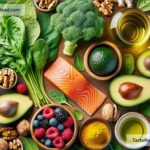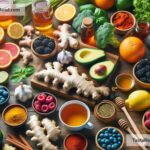Foods That May Help Reduce Breathlessness: A Simple Guide
Breathlessness, or shortness of breath, can be a frightening and uncomfortable experience. Sometimes it happens due to physical exertion, but for people living with respiratory conditions like asthma, Chronic Obstructive Pulmonary Disease (COPD), or other lung-related issues, it can occur even during moments of rest. While medical treatment is essential for managing these conditions, your diet can also play a supporting role. Certain foods are known to help improve lung health and may reduce breathlessness over time. In this article, we’ll explore some of these foods in simple terms.
How Food Helps with Breathlessness
Before we dive into the food list, let’s first understand how food can help you breathe better. Your lungs need oxygen to work well, but they’re also affected by inflammation, swelling, or a buildup of mucus. Eating supportive, nutrient-rich foods can help:
- Reduce inflammation in the airways.
- Boost oxygen levels by improving blood flow.
- Lower mucus production in the lungs.
- Provide vitamins and antioxidants that strengthen lung function.
If you choose your food wisely, it may complement your medical treatments and make breathing feel easier.
1. Leafy Green Vegetables
Leafy greens like spinach, kale, and Swiss chard are excellent for lung health. These vegetables are rich in vitamins C and E, which help reduce inflammation in the respiratory system. They also contain magnesium, a mineral that helps relax the muscles in your lungs. With relaxed lung muscles, you may notice fewer incidents of tightness or difficulty breathing.
Try adding leafy greens to salads, smoothies, or warm dishes to keep them part of your regular diet.
2. Fatty Fish
Fatty fish like salmon, mackerel, and tuna are rich in omega-3 fatty acids. Omega-3 is known to reduce inflammation in the body, which can help with conditions like asthma or COPD that cause inflamed airways. These healthy fats may also thin mucus, making it easier for you to clear your airways, so breathing feels less labored.
If you’re not a fan of fish, you can get omega-3 from plant-based sources like chia seeds, flaxseeds, and walnuts.
3. Garlic
Garlic has amazing properties for improving lung function. It contains a compound called allicin, which acts as a natural anti-inflammatory. For people living with asthma or other lung conditions, garlic may help open up the airways and make it easier to breathe. Plus, its antibacterial qualities could help prevent lung infections.
Consider adding garlic to your soups, stir-fries, or pasta dishes for a tasty and health-boosting ingredient.
4. Foods Rich in Vitamin C
Vitamin C is an antioxidant that can support better lung function. It helps fight free radicals, which are harmful particles that can damage your lungs. Foods rich in vitamin C, like oranges, strawberries, kiwis, bell peppers, and tomatoes, may reduce inflammation and provide your lungs with the nutrients they need to perform well.
Snacking on these fruits or adding them to your meals is an easy way to improve your vitamin C intake.
5. Ginger
If mucus buildup in your lungs is contributing to your breathlessness, ginger may help. Ginger is a natural anti-inflammatory and can help reduce swelling in the airways. It also stimulates mucus clearance, which can open up your lungs and make breathing easier.
Add ginger to your tea, meals, or smoothies for a refreshing and healing touch.
6. Nuts and Seeds
Nuts and seeds, such as almonds, sunflower seeds, and flaxseeds, are rich in vitamin E. Like vitamin C, vitamin E has strong antioxidant properties that can protect your lungs from damage caused by free radicals. This may improve airflow and reduce feelings of breathlessness, especially during physical activity.
Carry a handful of nuts as a snack, or sprinkle seeds over your yogurt or oatmeal for an easy nutrition boost.
7. Apples
There’s a saying: “An apple a day keeps the doctor away.” Apples contain antioxidants and flavonoids, which may help improve lung function over time. Studies have shown that people who eat more apples tend to have healthier lungs and are less likely to experience respiratory difficulties.
Grab an apple as a quick snack, or pair it with some peanut butter for a delicious treat.
8. Water
It may not be a food, but staying hydrated is essential for lung health. Drinking enough water keeps mucus in your lungs thin and easier to clear. When mucus is thick, it can make breathing harder. Aim for at least 6-8 glasses of water daily to support proper lung function.
Foods to Avoid
While some foods can help improve breathlessness, others can worsen it. Avoid foods that are high in salt, sugar, and preservatives, as they may increase inflammation and make it harder for you to breathe. Additionally, steer clear of dairy, as it may increase mucus production in some people.
Final Thoughts
The foods we eat have a direct impact on our overall health, including our ability to breathe easily. By adding anti-inflammatory and lung-supporting foods like leafy greens, fatty fish, garlic, and ginger to your diet, you may notice improvements in breathlessness over time. Pair good nutrition with any recommended medication or treatment plan from your doctor for the best results.
Remember, while food can help, it’s not a replacement for professional medical advice. If you experience persistent or severe breathlessness, consult a healthcare provider right away. Breathe well and stay healthy!


